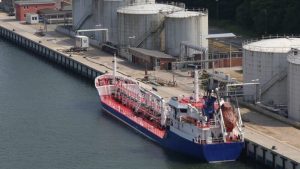 Tough new rules on marine fuel are forcing shipowners to explore liquefied natural gas as a cleaner alternative and ports such as Gibraltar are preparing to offer upgraded refueling facilities in the shipping industry’s biggest shake-up in decades.
Tough new rules on marine fuel are forcing shipowners to explore liquefied natural gas as a cleaner alternative and ports such as Gibraltar are preparing to offer upgraded refueling facilities in the shipping industry’s biggest shake-up in decades.
From 2020, International Maritime Organization rules will ban ships from using fuels with a sulfur content above 0.5 percent, compared with 3.5 percent now, unless they are equipped to clean up sulfur emissions. This will be enforced by fines levied by the IMO’s member states.
Using LNG to power ships instead of heavy fuel oil or the lighter marine gasoil can reduce polluting emissions of nitrogen oxides and sulfur oxides by 90 to 95 percent, according to industry estimates.
The stakes are high. Analysts at Swiss bank UBS estimate that the green shipping market could be worth at least $250 billion over the next five years.
To scoop up some that market, the British territory of Gibraltar is in the process of launching an LNG-fuelled power station whose accompanying storage tanks will also be able to be used to refuel cargo ships via barges.
Gibraltar already supplies the most marine fuel of any port in the Mediterranean and aims to do the same with LNG, said Manuel Tirado, chief executive of the Gibraltar Port Authority. Reuters
